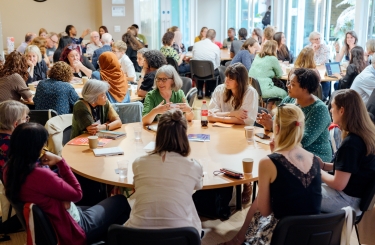Related



As part of our learning programme on place, we’re spotlighting how funders and community organisations are taking place-based approaches to tackle some of London’s biggest challenges.
London is experiencing some of the most acute impacts of the climate crisis in the UK. According to the Greater London Authority’s London Climate Resilience Review, the capital faces rising temperatures, increasing flood risk, worsening air pollution, and more vulnerability to extreme weather events. In 2022, London recorded temperatures exceeding 40°C for the first time, marking a historic and dangerous milestone. These changes disproportionately affect disadvantaged communities, which are more likely to live in areas with poor air quality, limited access to green spaces, and inefficient housing. As climate pressures intensify, the need for locally rooted, community-led responses becomes more urgent.
So what does it look like when communities lead on climate resilience in practice? And how can funders support approaches that are rooted in local knowledge, lived experience and place? In this learning interview, Dave Ahlquist from Locality reflects on the organisation’s work with community groups across London and beyond - exploring how practical support, peer learning and tailored funding can help unlock climate action that is both effective and equitable.
Dave: Locality is a membership network of over 2,000 place-based community organisations, many operating in disadvantaged areas. Our mission is two-fold: help those organisations become more resilient and shape a policy and funding environment that enables them to thrive. Climate resilience sits at the heart of both goals.
Ultimately, community work is climate work because the very organisations we support are on the frontline of both the impacts and the solutions
Our work on tackling the climate emergency includes a number of areas – we’ve just finished partnering with Groundwork and others on the £25 million Government VCSE Energy Efficiency Fund. This helped local community organisations audit their buildings, install insulation, swap to LED lighting and, where feasible, put solar on their roofs. On another level, we champion issues like community ownership and local procurement, recognising that asset-rich but excluded communities often bear the heaviest climate burdens: rising energy costs, extreme weather and pollution.
We’ve also worked with the Greater London Authority (GLA) on the Community Spaces at Risk Fund to preserve Black-led local spaces and community centres through a mix of grants and wider support. Many of these spaces become important resilience hubs during extreme weather events, so it’s vital that they’re protected and able to thrive. We know that disadvantaged communities are most affected by the climate crisis, but where you live also matters – weather patterns, the cost of energy and particularly air pollution are huge issues in London. Ultimately, community work is climate work because the very organisations we support are on the frontline of both the impacts and the solutions.
Dave: One thing we do is help local community centres “get their own house in order”, so practical steps like energy audits of their own buildings and get capital funds to make their buildings more sustainable.
Beyond that, we worked with IPPR and Power to Change to map out viable community-business models - from community-owned wind turbines and paint recycling to urban food-growing co-ops and community car clubs. We scored each model on scalability, financial viability, people-power and climate impact. That framework enables groups to pick the right approach for their local area rather than chasing a one-size-fits-all solution.
We’ve also seen that building on local knowledge and community networks is key to this work – what works in Bristol, where some of our members are building community wind turbines, is not necessarily going to work in London, where there are particular concerns around air pollution, access to spaces (especially shaded spaces when we get extreme heat) and savings on energy costs. Organisations like Community Energy London are working to help community centres and schools install solar panels on their roofs, providing some excellent examples in the capital that build on communities' own knowledge to take action.
Dave: So far, I think there are three main things that stand out. First is that language matters when it comes to climate action work. Terms like ‘net zero’ can feel abstract or even politically charged. We’ve learnt to lead with co-benefits when speaking to community organisations: energy savings, lower bills, improved health, better public spaces. Framing climate action around “making our places liveable” cuts through scepticism.
Second is that diversity of voices is essential. The professional climate sector can be dominated by technical jargon and a narrow demographic. Community organisations bring lived experience and local insight, which not only grounds projects in real needs but also helps funders reach people who’ve historically been excluded from environmental decision-making.
Finally, network effects multiply impact. One community hub swapping lightbulbs is great. But when 2,000 hubs also share lessons on procurement, business models and partnerships, the collective impact on emissions and on social outcomes can be transformative. Peer learning and mentoring are just as important as grant support.
By working through the lens of place, funders can ensure that climate action is not an add-on but an integral part of local community development
Dave: I think we’re seeing increasing examples of climate-focused funding, which is great - GLA’s Green Roots Fund and the National Lottery’s Climate Action Fund are two good examples. Others are also moving in the right direction, but there’s room for more, including:
By working through the lens of place, funders can ensure that climate action is not an add-on but an integral part of local community development. The communities most at risk from climate impacts have the creativity, the networks and the will to lead - what they need is coordinated, flexible funding that meets them where they are.
We’re grateful to Dave and the Locality team for sharing their insights. If you’d like to explore partnership opportunities or learn more about their community-led climate work, visit https://locality.org.uk/news/helping-communities-climate-change


